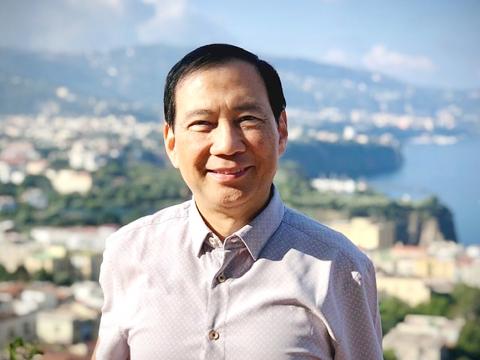National Taiwan University (NTU) has announced that professor Chen Pi-sin (陳丕燊) has been named a Blaise Pascal Chair for his research into simulated black holes.
Chen, who is director of the Leung Center for Cosmology and Particle Astrophysics at the university, said the chair would enable him to continue his research into black holes.
He has over the past year worked with Nobel Prize in Physics laureate Gerard Mouru on an experiment both had proposed in the paper “Accelerating Plasma Mirrors to Investigate the Black Hole Information Loss Paradox,” published by Physical Review Letters in January last year.

Photo courtesy of National Taiwan University
The two are exploring what is known to as the black hole information paradox, namely whether physical information would continue to exist when it is devoured by a black hole.
The premise of the experiment hypothesized that Albert Einstein’s theories of general and special relativity could be paradoxical with quantum mechanics, Chen said.
“With the use of lasers, plasma targets with density gradients and relativistic plasma mirrors, we have created an environment analogous to the late-time evolution of black hole Hawking radiation,” Chen said.
Chen is to be invited to conduct further experiments at Ecole Polytechnique in Paris, where he would have access to the Laboratoire pour l’Utilisation des Lasers Intenses, the university said.
The Blaise Pascal Chair, named after one of the first two inventors of the mechanical calculator, was conceived in 1996 by the government of the Ile de France region, which surrounds Paris, to invite prestigious academics to visit and study.
The laureate of the Blaise Pascal Chair is considered an extremely prestigious position.
Of more than 90 chair recipients over the years, five have been Nobel Prize winners.
Nominees are chosen every year by a scientific committee from outstanding scientists around the world in a wide range of disciplines.
Additional reporting by CNA

Taiwan is stepping up plans to create self-sufficient supply chains for combat drones and increase foreign orders from the US to counter China’s numerical superiority, a defense official said on Saturday. Commenting on condition of anonymity, the official said the nation’s armed forces are in agreement with US Admiral Samuel Paparo’s assessment that Taiwan’s military must be prepared to turn the nation’s waters into a “hellscape” for the Chinese People’s Liberation Army (PLA). Paparo, the commander of the US Indo-Pacific Command, reiterated the concept during a Congressional hearing in Washington on Wednesday. He first coined the term in a security conference last

Prosecutors today declined to say who was questioned regarding alleged forgery on petitions to recall Democratic Progressive Party (DPP) legislators, after Chinese-language media earlier reported that members of the Chinese Nationalist Party (KMT) Youth League were brought in for questioning. The Ministry of Justice Investigation Bureau confirmed that two people had been questioned, but did not disclose any further information about the ongoing investigation. KMT Youth League members Lee Hsiao-liang (李孝亮) and Liu Szu-yin (劉思吟) — who are leading the effort to recall DPP caucus chief executive Rosalia Wu (吳思瑤) and Legislator Wu Pei-yi (吳沛憶) — both posted on Facebook saying: “I

The Ministry of Economic Affairs has fined Taobao NT$1.2 million (US$36,912) for advertisements that exceed its approved business scope, requiring the Chinese e-commerce platform to make corrections in the first half of this year or its license may be revoked. Lawmakers have called for stricter enforcement of Chinese e-commerce platforms and measures to prevent China from laundering its goods through Taiwan in response to US President Donald Trump’s heavy tariffs on China. The Legislative Yuan’s Finance Committee met today to discuss policies to prevent China from dumping goods in Taiwan, inviting government agencies to report. Democratic Progressive Party Legislator Kuo Kuo-wen (郭國文) said

The Ministry of Economic Affairs has fined Taobao NT$1.2 million (US$36,900) for advertisements that exceeded its approved business scope and ordered the Chinese e-commerce platform to make corrections in the first half of this year or its license would be revoked. Lawmakers have called for stricter supervision of Chinese e-commerce platforms and more stringent measures to prevent China from laundering its goods through Taiwan as US President Donald Trump’s administration cracks down on origin laundering. The legislature’s Finance Committee yesterday met to discuss policies to prevent China from dumping goods in Taiwan, inviting government agencies to report on the matter. Democratic Progressive Party